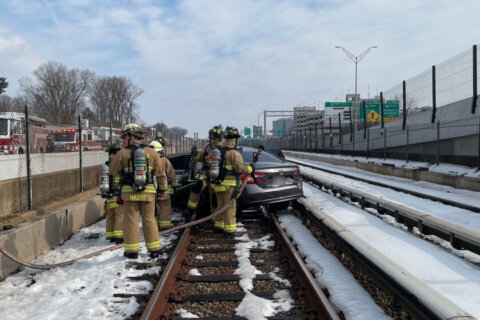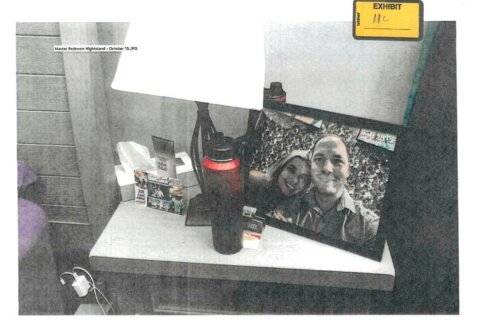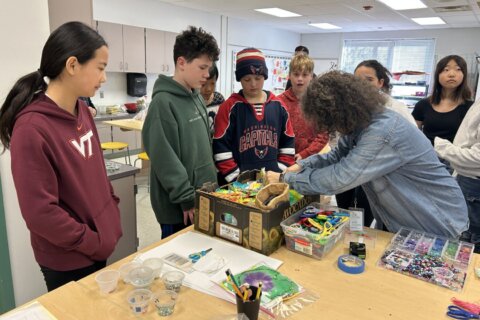As if trying to extinguish a raging inferno wasn’t dangerous enough, firefighters face life-threatening risks even after the blaze is knocked down.
Fairfax County Fire and Rescue Department Capt. Barry Maham is living proof, two years after he was diagnosed with stage four colon cancer.
Firefighters face a 9% increased risk of cancer, according to the National Institute of Occupational Safety and Health, and more than 14% higher than the general public, according to the Centers for Disease Control and Prevention.
Fairfax County’s fire department is offering free early cancer screenings to all of its members.
Battalion Chief Brian Edmonston said all current firefighters and those who retired within the last five years are eligible for the ultrasound scans after a $450,000 grant from the Federal Emergency Management Agency.
The diagnostic screening includes an echocardiogram, carotid Doppler, abdominal aorta, thyroid, live, gall bladder, spleen, bladder and kidney scans, as well as testicular scans for males and exterior pelvic scans for females, said Edmonston.
In 2021, while having no symptoms, Maham decided to take advantage of the opportunity to get scanned — he was told his spleen was enlarged.
That triggered further examinations, tests and consultations, and he was diagnosed with a blood clot in his leg. “A week later I went for a colonoscopy, they found a blockage, and the doctor told me he thought it was cancer — two days later, they called to confirm I had colon cancer.”
Maham said having the scan helped detect his cancer earlier.
”The scan itself didn’t find mine, but it found the body trying to fight the cancer, by the spleen being enlarged,” said Maham. “It gave me a jump in getting the appointments lined up with the doctors, before I knew I had the cancer.”
”When I woke up from surgery, I was told it took four-and-a-half hours longer than expected,” said Maham. “They found another tumor, and they removed 24 (lymph) nodes, and eight of those were positive, so I now needed chemo.”
When cancer spreads to other parts of the body, chemotherapy and targeted therapies are generally the standard treatments.
Living — and working — with cancer
Maham weathered his cancer treatment.
“I returned to work, I was feeling really well, walking three miles every day,” he said. With stage 4 cancer, “they told me there’s a possibility in the next three to five years that I have cancer again.”
Cancer recurred even sooner: “I was diagnosed in October 2022 that the cancer had now spread to my liver — that was the hardest for me, tougher than the first diagnosis of cancer.”
“It was a rough 48 hours for me to process that,” recalled Maham. Yet, he resumed his treatment, and is back on the job, along with other colleagues who have benefited from the early screening.
“There’s roughly 44 firefighters in the field with cancer,” he said.
The burning materials firefighters deal with are increasingly dangerous, Edmonston said.
“We’ve seen a significant change over the last decades, from legacy materials, like more natural fibers to synthetic fibers,” said Edmonston. “So, when those items burn, it could be in a vehicle, a home, there’s a lot more hazards associated with the combustion of the fire.”
Edmonston said the early screening is part of the department’s efforts to keep employees healthy.
”With cancer, we know the earlier we can treat it, most cancers are treatable in the early phases,” he said. “Get it diagnosed early, get it found early, and get it treatable, so people can enjoy their lives, in quantity and quality.”
He says most firefighters are availing themselves of the screening, although there remains some apprehension: “I think it’s the ‘what you don’t know won’t hurt you,’ kind of thing,” said Edmonston.
“There’s apprehension, there’s anxiety — cancer is a really strong word, and has a lot of strong meaning, and there could be negative consequences,” said Edmonston.
More and more fire departments are offering health screenings, in part to reassure potential career applicants, said Edmonston.
“We’re able to provide these high level medical services to folks, to say ‘we’re gonna look out for you from your date of hire and into retirement,'” he said.








